-
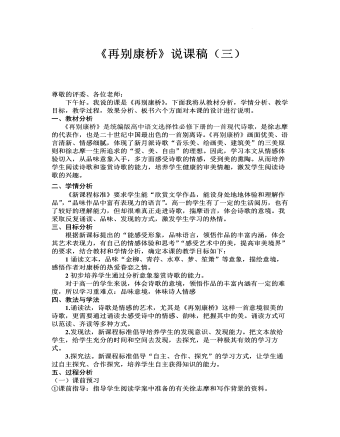
《再别康桥》说课稿(三) 2021-2022学年统编版高中语文选择性必修下册
四、教法与学法1.诵读法,诗歌是情感的艺术,尤其是《再别康桥》这样一首意境很美的诗歌,更需要通过诵读去感受诗中的情感、韵味,把握其中的美。诵读方式可以范读、齐读等多种方式。2.发现法,新课程标准倡导培养学生的发现意识、发现能力。把文本放给学生,给学生充分的时间和空间去发现,去探究,是一种极其有效的学习方式。3.探究法。新课程标准倡导“自主、合作、探究”的学习方式,让学生通过自主探究、合作探究,培养学生自主获得知识的能力。 五、过程分析(一)课前预习①课前指导:指导学生阅读学案中准备的有关徐志摩和写作背景的资料。②指导学生诵读文本,读准字音,读出节奏,体会感情。鉴赏诗歌离不开诗歌意象和有感情的诵读,引导学生边读边思考:诗歌写了什么内容?从哪些句子看出来?勾画出你感受最深的句子。怎样朗读才能从分表达作者的感情?让学生设计一个自己认为最值得探究的问题。让学生设计一个自己认为本文最值得探究的问题。
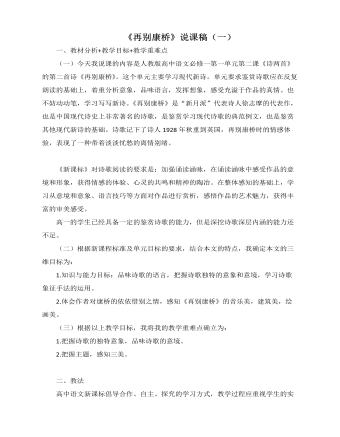
《再别康桥》说课稿(一) 2020-2021学年统编版高中语文选择性必修下册
2.对比联想法。让学生在诵读的基础上,对《再别康桥》中康桥美景的赏析和意象进行解读,引导学生欣赏诗歌的画面美,从而受到审美的体验。3.探究式学习法。引导学生对《再别康桥》情感和主题的探究。充分发挥学生自主学习的能力,引导学生主动地获取知识,重视学生的实践活动。三、学法1、诵读法 加强诵读,这是阅读诗词的一般方法。2、体悟法 通过意象把握情感,主要是让学生设身处地走进雨巷去感悟。3、联想比较法 通过与诗人的其他作品的比较学习,体会创作风格及作者情感。四、教学过程教学过程设计一、导入自古以来,离别总免不了沉重的愁绪。比如王维《宋元二使安西》:劝君更尽一杯酒,西出阳关无故人。李白《黄鹤楼送孟浩然之广陵》:孤帆远影碧空尽,唯见长江天际流。柳永《雨霖铃》执手相看泪眼,竟无语凝噎。正所谓自古多情伤离别,更那堪冷落清秋节啊。(设计目的:以离别主题的诗歌导入课文,让学生更快地进入课文情境。)
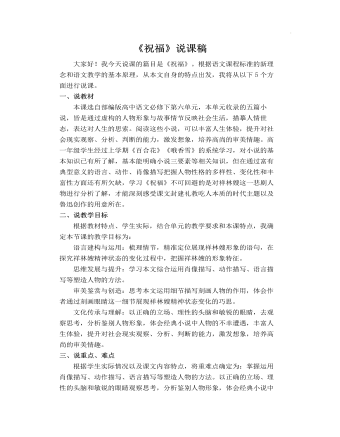
《祝福》说课稿(二) 2021-2022学年统编版高中语文必修下册
三、说重点、难点 根据学生实际情况以及课文内容特点,将重难点确定为:掌握运用肖像描写、动作描写、语言描写等塑造人物的方法。以正确的立场、理性的头脑和敏锐的眼睛观察思考,分析鉴别人物形象,体会经典小说中人物的不幸遭遇,从而提升对社会现实观察、分析、判断的能力。四、说教学方法 1.教法根据学生的这些情况,我采用了以下的教法:⑴创设情境法。通过创设“探究祥林嫂之死”阅读情境与任务,激发学生阅读兴趣,引导学生发挥主观能动性,逐层深入阅读、鉴赏与探究。⑵点拨法。适当点拨,引导学生回忆以往学过塑造人物形象的方法等相关知识。 ⑶当堂训练法。通过让学生用语言描述不同时期祥林嫂的眼睛特点,检测学生的感悟情况,判断学生对所学内容的接受程度。2.学法本节课充分发挥学生主体作用,引导学生自主学习,探究式学习。具体方法如下:(1)课前预习(此文长达万余字,难以做到在课堂上让学生通读全文,需要提前布置课前预习任务,培养学生阅读的自觉性。)
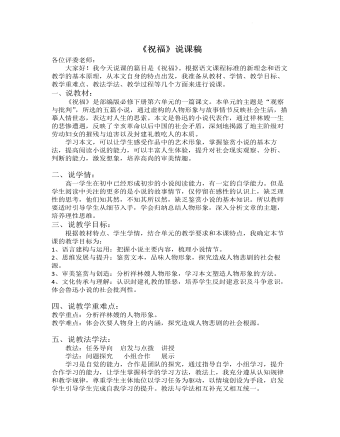
《祝福》说课稿(一) 2021-2022学年统编版高中语文必修下册
三、说教学目标:根据教材特点、学生学情,结合单元的教学要求和本课特点,我确定本节课的教学目标为:1、语言建构与运用:把握小说主要内容,梳理小说情节。2、思维发展与提升:鉴赏文本,品味人物形象,探究造成人物悲剧的社会根源。3、审美鉴赏与创造:分析祥林嫂人物形象,学习本文塑造人物形象的方法。4、文化传承与理解:认识封建礼教的罪恶,培养学生反封建意识及斗争意识,体会鲁迅小说的社会批判性。四、说教学重难点:教学重点:分析祥林嫂的人物形象。教学难点:体会次要人物身上的内涵,探究造成人物悲剧的社会根源。五、说教法学法:教法:任务导向 启发与点拨 讲授学法:问题探究 小组合作 展示学习是自觉的能力,合作是团队的探究,通过指导自学,小组学习,提升合作学习的能力,让学生掌握科学的学习方法,教法上,我充分遵从认知规律和教学规律,尊重学生主体地位以学习任务为驱动,以情境创设为手段,启
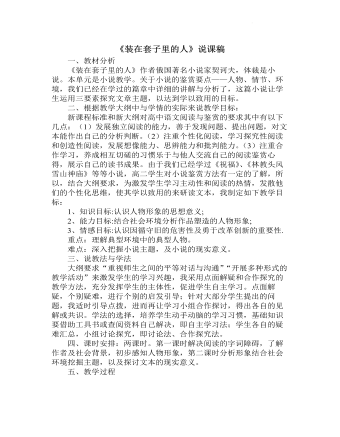
《装在套子里的人》说课稿 2021-2022学年统编版高中语文必修下册
8、板书装在套子里的人别里科夫的形象——有形的套子套己——无形的套子套人第二课时合作探究:目标挖掘主题及现实意义。问题设置,衔接上节课内容,层层深入。1、结合上节课别里科夫的形象分析:他的思想被什么套住,其悲剧原因在哪?(根据人物形象的分析与社会背景的了解,直击主题。)沙皇腐朽的专制统治套住了他的思想,沙皇的清规戒律使他不敢越雷池一步,所以他是受害者,但他的身份性格以及特定的社会环境,又让他成为沙皇统治的捍卫者。2、他恋爱的情节以及科瓦连科这两个人物的塑造的意义?(从人物以及主题入手,推翻沙皇的腐朽反动的统治,必须是每一个人都敢于打破套子,唤醒革新,更新观念,拒绝腐朽。)别里科夫渴望打破束缚,也想革新,而科瓦连科两个人物体现朝气活泼,以及勇于打破常规束缚的勇气,为革新升起了一片曙光。3、塑造别里科夫的手法,除了一般刻画人物方法外,还有什么方法?
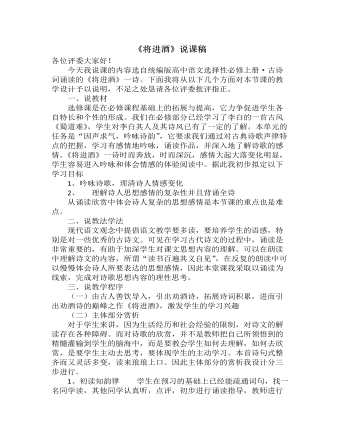
古诗词诵读《将进酒》说课稿2021-2022学年高中语文统编版选择性必修上册
一、说教材选修课是在必修课程基础上的拓展与提高,它力争促进学生各自特长和个性的形成。我们在必修部分已经学习了李白的一首古风《蜀道难》,学生对李白其人及其诗风已有了一定的了解。本单元的任务是“因声求气,吟咏诗韵”,它要求我们通过对古典诗歌声律特点的把握,学习有感情地吟咏,诵读作品,并深入地了解诗歌的感情。《将进酒》一诗时而奔放,时而深沉,感情大起大落变化明显,学生容易进入吟咏和体会情感的体验阅读中。二、说教法学法现代语文观念中提倡语文教学要多读,要培养学生的语感,特别是对一些优秀的古诗文。可见在学习古代诗文的过程中,诵读是非常重要的,有助于加深学生对课文思想内容的理解。可以在朗读中理解诗文的内容,所谓“读书百遍其义自见”,在反复的朗读中可以慢慢体会诗人所要表达的思想感情,因此本堂课我采取以诵读为线索,完成对诗歌思想内容的理性思考。
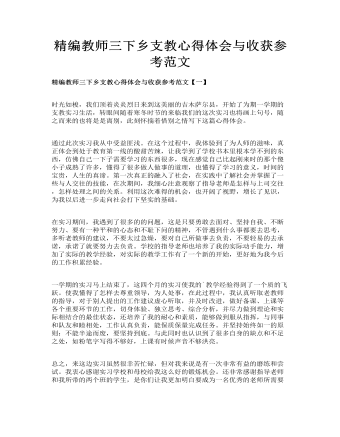
精编教师三下乡支教心得体会与收获参考范文
一学期的实习马上结束了,这四个月的实习使我的`教学经验得到了一个质的飞跃。使我懂得了怎样去尊重领导,为人处事,在此过程中,我认真听取老教师的指导,对于别人提出的工作建议虚心听取,并及时改进,做好备课、上课等各个重要环节的工作,切身体验、独立思考、综合分析,并尽力做到理论和实际相结合的最佳状态,还培养了我的耐心和素质,能够做到服从指挥,与同事和队友和睦相处,工作认真负责,能保质保量完成任务。并坚持始终如一的原则:不能半途而废,要坚持到底。与此同时也认识到了很多自身的缺点和不足之处,如粉笔字写得不够好,上课有时候声音不够洪亮。
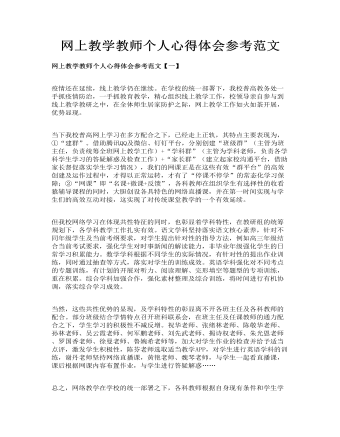
网上教学教师个人心得体会参考范文
但我校网络学习在体现共性特征的同时,也彰显着学科特性,在教研组的统筹规划下,各学科教学工作扎实有效。语文学科坚持落实语文核心素养,针对不同年级学生及当前考纲要求,对学生提出针对性的指导方法,例如高三年级结合当前考试要求,强化学生对时事新闻的解读能力,非毕业年级强化学生的日常学习积累能力。数学学科根据不同学生的实际情况,有针对性的提出作业训练,同时通过抽查等方式,落实对学生的训练成效。英语学科强化对不同考点的专题训练,有计划的开展对听力、阅读理解、完形填空等题型的专项训练,重在积累。综合学科加强合作,强化素材整理及综合训练,将时间进行有机协调,落实综合学习成效。
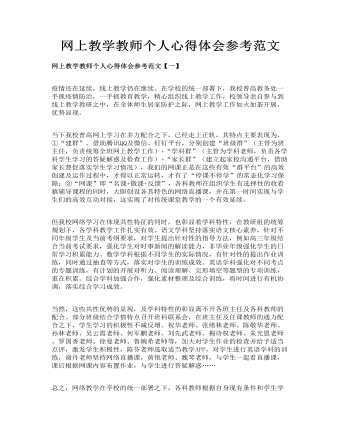
网上教学教师个人心得体会参考范文
但我校网络学习在体现共性特征的同时,也彰显着学科特性,在教研组的统筹规划下,各学科教学工作扎实有效。语文学科坚持落实语文核心素养,针对不同年级学生及当前考纲要求,对学生提出针对性的指导方法,例如高三年级结合当前考试要求,强化学生对时事新闻的解读能力,非毕业年级强化学生的日常学习积累能力。数学学科根据不同学生的实际情况,有针对性的提出作业训练,同时通过抽查等方式,落实对学生的训练成效。英语学科强化对不同考点的专题训练,有计划的开展对听力、阅读理解、完形填空等题型的专项训练,重在积累。综合学科加强合作,强化素材整理及综合训练,将时间进行有机协调,落实综合学习成效。
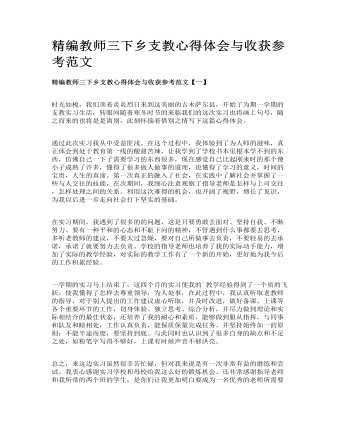
精编教师三下乡支教心得体会与收获参考范文
一学期的实习马上结束了,这四个月的实习使我的`教学经验得到了一个质的飞跃。使我懂得了怎样去尊重领导,为人处事,在此过程中,我认真听取老教师的指导,对于别人提出的工作建议虚心听取,并及时改进,做好备课、上课等各个重要环节的工作,切身体验、独立思考、综合分析,并尽力做到理论和实际相结合的最佳状态,还培养了我的耐心和素质,能够做到服从指挥,与同事和队友和睦相处,工作认真负责,能保质保量完成任务。并坚持始终如一的原则:不能半途而废,要坚持到底。与此同时也认识到了很多自身的缺点和不足之处,如粉笔字写得不够好,上课有时候声音不够洪亮。
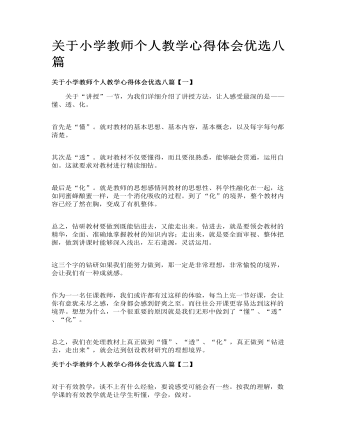
关于小学教师个人教学心得体会优选八篇
作为一一名任课教师,我们或许都有过这样的体验,每当上完一节好课,会让你有意犹未尽之感,全身都会感到舒爽之至。而往往公开课更容易达到这样的境界。想想为什么,一个很重要的原因就是我们无形中做到了“懂”、“透”、“化”。 总之,我们在处理教材上真正做到“懂”、“透”、“化”,真正做到“钻进去,走出来”,就会达到创设教材研究的理想境界。
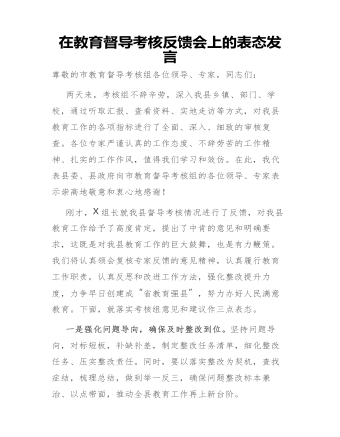
在教育督导考核反馈会上的表态发言
一是强化问题导向,确保及时整改到位。坚持问题导向,对标短板,补缺补差,制定整改任务清单,细化整改任务、压实整改责任。同时,要以落实整改为契机,查找症结,梳理总结,做到举一反三,确保问题整改标本兼治、以点带面,推动全县教育工作再上新台阶。
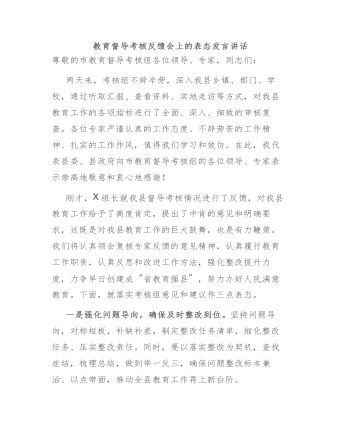
在教育督导考核反馈会上的表态发言讲话
一是强化问题导向,确保及时整改到位。坚持问题导向,对标短板,补缺补差,制定整改任务清单,细化整改任务、压实整改责任。同时,要以落实整改为契机,查找症结,梳理总结,做到举一反三,确保问题整改标本兼治、以点带面,推动全县教育工作再上新台阶。
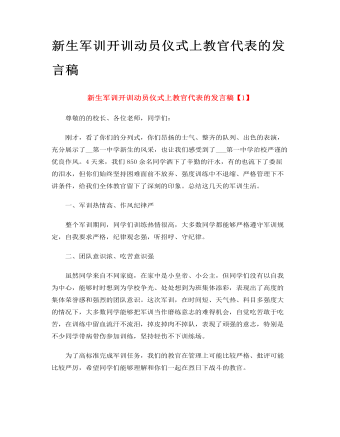
新生军训开训动员仪式上教官代表的发言稿
同学们,军训很苦,苦的让人不愿坚持,但军训也很甜,他可以增强我们的体魄,深化我们的情感,提升我们的思想境界。为此,我对同学们提出三点要求: 一、要求同学们要把自己当做一名真正的军人,严格要求自己,继承和发扬不怕苦、不怕累、艰苦奋斗的精神,克服困难、努力拼搏,圆满完成军训任务。 二、希望同学们在接下来的军训中,学会关心集体,关心他人,建立深厚的战友情、同学情,增强班级荣誉感。 三、希望同学们每天训练后要认真总结,及时深化心灵深处的精神力量,使之成为将来学习、生活和工作所需的宝贵财富。
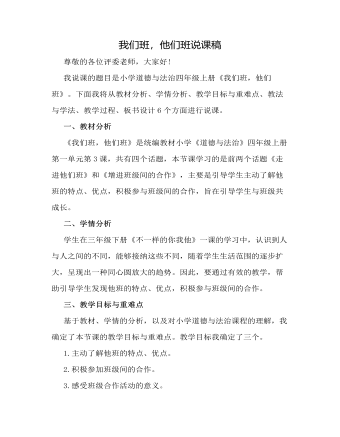
人教部编版道德与法制四年级上册我们班他们班说课稿
在上面两个活动的基础上,教师引导学生交流:你认为开展这类班级合作活动有什么意义?大家可以从中收获什么?板书:与班级共成长。设计意图:引导学生感受并认识班级间合作的意义。环节三:课堂小结,内化提升学生谈一谈学习本节课的收获,教师相机引导。设计意图:梳理总结,体验收获与成功的喜悦,内化提升学生的认识与情感。环节四:布置作业,课外延伸今后的学校生活中,积极地参与班级间的合作。设计意图:将课堂所学延伸到学生的日常生活中,有利于落实行为实践。六、板书设计为了突出重点,让学生整体上感知本节课的主要内容,我将以思维导图的形式设计板书:在黑板中上方的中间位置是课题《我们班,他们班》,下面是:班级的各种特点,积极参与班级间的合作,与班级共成长

新人教版高中英语必修3Unit 1 Festivals and Celebrations-Reading and Thinking教学设计
The topic of this part is “Discover the reasons for festivals and celebrations.The Listening & Speaking & Talking part aims at talking about the experiences and feelings or emotions about the festivals and celebrations. This section aims at detecting the reason why the people celebrate the festivals, the time, the places, the types and the way of celebrations. It also explains why some traditions in the old celebrations are disappearing, like the firecrackers in the big cities and some new things are appearing like the prosperity of business or commerce. 1. Students can talk about what festivals they know and the reasons and the way of celebrating them.2. Students should learn the reading skills such as the headline and get the topic sentences, the structures of articles.3. Students can understand the past, the present situation of some festival around the world and why there are some changes about them. 4. Students can have the international awareness about the festivals.1. Students should learn the reading skills such as the headline and get the topic sentences, the structures of articles.2. Students can understand the past, the present situation of some festival around the world and why there are some changes about them.Step 1 Lead in---Small talkWhat festival do you like best ? Why ?I like the Spring Festivals because I can set off the fireworks, receive the lucky money and enjoy the Gala with my families.Step 2 Before reading---Pair workWhy do people celebrate different festivals ?The Spring Festivals is to celebrate the end of winter and the coming of spring and new life.The Mid-autumn Day is to celebrate the harvest and admire the moon.

新人教版高中英语必修3Unit 1 Festivals and Celebrations-Listening &Speaking&Talking教学设计
The theme of this section is “Talk about festival activities and festival experiences”.Festival and holiday is a relaxing and interesting topic for students. This part talks about the topic from the daily life of students’. In the part A ---Listening and Speaking, there are three conversations among different speakers from three countries(Japan, Rio and China), where the speakers are participating in or going to participate in the festivals and celebrations. So listening for the relationship among them is a fundamental task. Actually, with the globalization and more international communication, it is normal for Chinese or foreigners to witness different festivals and celebrations in or out of China. In the Conversation 1, a foreign reporter is interviewing a Japanese young girl who just had participated in the ceremony of the Coming-of-Age Day on the street and asking her feeling about the ceremony and the afterwards activities. Conversation 2, Chinese girl Li Mei is witnessing the Rio Carnival for the first time, and her friend Carla gives her some advice on the costumes which enables her to match with the carnival to have a good time. Conversation 3, a Chinese guide is showing a group of foreign visitors around the Lantern Festival and introducing the customs of the festival to them. The three conversations have a strong vitality and insert the festival and cultural elements from different countries. So perceiving the festivals and cultures from different countries is the second task. At the same time, the scripts also insert the targeted grammar --- v-ing as attributive and predicative, which students can perceive and experience in a real context and make a road for the further study. That is the third task. In the Part B--- Listening and Talking, the theme is “Talk about festival experience”, which is the common topic in our daily conversations. During the conversation, Song Lin, a Chinese student, asked Canadian friend Max about how to spend Christmas. In the conversation, Song Lin talked about experience and the feelings during the Chinese Spring Festival, during which there are not only some enjoyable things but some unpleasant things. After the listening, perhaps students find there are some similarities between Christmas and the Chinese Spring Festival as there are some differences in the origins and celebrations. For example, people always visit friends and relatives, decorate their houses, have a big dinner together, chat and give presents to each other.

新人教版高中英语必修3Unit 1 Festivals and Celebrations-Reading for writing教学设计二
Step 3 Analyzing article structureActivity 31. Teachers raise questions to guide students to analyze the chapter structure of this diary and think about how to describe the festival experience. (1)What should be included in the opening/body/closing paragraph(s)?(2)How did the writer arrange his/her ideas?(3)What kind of interesting details did the writer describe?(4)How did the writer describe his/her feelings/emotions during the event?2. Students read and compare the three sentence patterns in activity 2. Try to rewrite the first paragraph of the diary with these three sentence patterns. After that, students exchange corrections with their partners. Such as:●This was my first time spending three days experiencing the Naadam Festival in China’s Inner Mongolia Autonomous Region and it was an enjoyable and exciting experience. ●I'll never forget my experience at the Naadam Festival because it was my first time to watch the exciting Mongolian games of horse racing, wrestling, and archery so closely. ●I'll always remember my first experience at the Naadam Festival in China’s Inner Mongolia Autonomous Region because it was so amazing to spend three days witnessing a grand Mongolian ceremony. Step 4 Accumulation of statementsActivity 41. Ask the students to read the diary again. Look for sentences that express feelings and emotions, especially those with the -ing form and the past participle. Such as:● …horse racing, wrestling, and archery, which are all so exciting to watch. ● some amazing performances● I was surprised to see…● I was a little worried about. . . ● feeling really tiredOther emotional statements:●I absolutely enjoyed the archery, too, but the horse races were my favourite part. ●I'm finally back home now, feeling really tired, but celebrating Naadam with my friend was totally worth it. ●He invited me back for the winter to stay in a traditional Mongolian tent and cat hot pot. I can’t wait!2. In addition to the use of the -ing form and the past participle, the teacher should guide the students in the appreciation of these statements, ask them to memorize them, and encourage them to use them reasonably in writing practice.

新人教版高中英语必修3Unit 2 Morals and Virtues-Discovering Useful Structure教学设计
1. 表示时间。Hearing these stories, I’m skeptical about the place. = When I heard these stories. . . 2. 表示原因。Not knowing his address, I can’t send this book to him. = Because/Since/As I don’t know his address. . . 3. 表示结果。His father died, leaving him a lot of money. =. . . and left him a lot of money4. 表示条件。Going straight down the road, you will find the department store. = If you go straight down the road. . . 5. 表示让步。Being tired, they went on working. =Although they were tired. . . 6. 表示行为方式、伴随情况或补充说明。He lay on the grass, staring at the sky for a long time. =. . . and stared at the sky for a long time注意:非谓语动词作状语时, 如所提供的动词不能和句子中的主语保持一致, 动词-ing形式必须有自己的逻辑主语, 通常由名词或代词来担任, 这就是独立主格结构。The last bus having gone, we had to walk home. (having gone的逻辑主语是the last bus, 而不是we)Weather permitting, the football match will be played on Friday. (permitting的逻辑主语是time, 而不是the football match)Step 7 Practice1. ________(study) hard, you are sure to get first prize. 2. People use plastic in their daily life, _______(leave) large amounts of waste. 3. ________(work) hard at your lessons, you are to succeed. 4. The old man, ____________(work) abroad for twenty years, is on the way back to his motherland. 5. ______________(finish) his homework, he was playing on the playground. Answers: 1. Studying 2. leaving 3. Working 4.having worked 5. Having finishedStep 8 HomeworkFinish the homework on Page 22.

新人教版高中英语必修3Unit 2 Morals and Virtues-Listening &Speaking&Talking教学设计
Example:One day, a poor boy who was trying to pay his way through school by sending newspapers door to door found that he only had one dime(一角)left. He was so hungry that he decided to beg for a meal at the next house.However, he lost his nerve when a lovely young woman opened the door. Instead of a meal he asked for a drink of water. She thought he looked hungry so she brought him a large glass of milk. He drank it slowly, and then asked, “How much do I owe you?” “You don’t owe me anything,” she replied, “Mother has taught me never to accept pay for a kindness.” “Then I thank you from the bottom of my heart.” With these words, Howard Kelly left that house.Years later the woman became badly ill and was finally sent to the hospital in a big city. Dr. Howard Kelly, now famous, was called in. When he heard the name of the town she came from, a strange light filled his eyes. Dressed in his doctor’s clothes, Dr. Kelly went into her room and recognized her at once. From that day on, he gave special attention to her, and decided to do his best to save her life.At last the woman was saved. Dr. Kelly asked the business office to pass the final bill to him. He looked at it and then wrote something on the side. The bill was sent to the woman’s room. She was afraid to open it because she was sure that it would take the rest of her life to pay for it off. Finally she looked, and the note on the side of the bill caught her attention. She read these words: “Paid in full with a glass of milk, Dr. Howard Kelly.” Tear of joy flooded her eyes.

